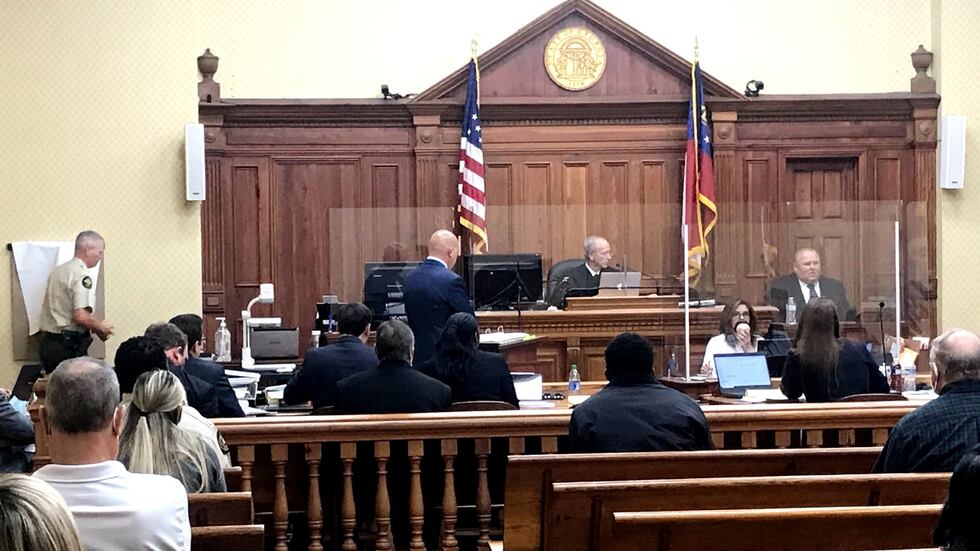In Washington County ex-cops’ trial, stun-gun expert describes risks
SANDERSVILLE, Ga. (WRDW/WAGT) - Testimony from defense witnesses continued Wednesday as a trial entered the fifth day for three former deputies accused in the stun-gun death of Eurie Martin in 2017.
Mark Kroll, electrical weapons expert and biomedical professor took the stand in the trial of former deputies Rhett Scott, Michael Howell and Henry Copeland.
He spoke about the history of stun guns and electricity. He said electrocution is death by electricity and that Martin’s death was not an electrocution.
He said no one has ever been electrocuted from a stun gun.
The most common risk factors from stun guns are falling (resulting in head trauma), the probe hitting a subject’s eye and fire or spark, he said.
Testifying that risks are rare, he said death after a tasing does not mean tasing was the cause.
He said previous medical conditions such as heart disease do not impact the intensity of tasing or the risk of death.
Martin’s family says he had a history of mental health issues and was only walking from one place to another to visit his family when deputes came to the scene to investigate a report of a suspicious person. Their encounter with Martin ended up with him dead after he was shocked multiple times.
Also taking the stand Wednesday was Michael Graham, a forensic pathologist.
He testified that a stun gun is not considered a deadly weapon because the number of deaths related to a stun gun is not high enough to conclude that it is deadly force. He says a homicide ruling by a medical examiner does not necessarily mean murder.
The judge asked the former deputies if they’d like to testify.
Howell and Scott decided to testify. Copeland opted out.
Howell was a part-time deputy and correctional officer not equipped with a stun gun.

On the stand, he walked the jury through his thoughts as his body cam video played.
He said he pulled up with no intention to arrest Martin and asked for his name, to which Martin responded, “Who are you?”
He a said Martin had “evil look” and walked away.
He called for backup, and Copeland arrived. He told Copeland to “tase his ass” as heard in the video.
He said he felt he had reason to arrest Martin because he was walking in the roadway, which is a violation of state law.
He says just before tasing him, Martin threw his soft drink can and took a defensive stance.
At that time, Howell gripped his gun but did not pull out.
Copeland gave Martin demands, and he did not comply and was shocked by Copeland.
Howell tried to handcuff him and noticed he pulled the stun gun probe out. He said it was scary and he backed away.
Defense witnesses testified for the first time on Tuesday.
“He wasn’t fighting, but he wasn’t allowing them to handcuff him, either,” said Jasmine Williams in her 2017 eyewitness interview with Georgia Bureau of Investigation agents.
Williams didn’t much about July 7, 2017, so the court played back her interview with the GBI from that day.
“The three of them continued to try to talk to him and they surrounded him and he was continuing to be, you know, hollering and he appeared to be not cooperative” said Williams in the interview.
Officers first shocked Martin and managed to get only one hand in cuffs.
“All three of them were on him trying to cuff him. They seemed to be having some issues” she said.
Martin also pulled off the stun gun probes, which an expert witness claimed was out of the norm and might require more force.
“That’s unheard of. That would further elevate the deputies’ mindset of alert about safety, about the strength of perhaps Mr. Martin and the mental condition of Mr. Martin and the drugs of Mr. Martin perhaps” said Dr. Darrell Lee Ross, professor and use-of-force expert.
Ross testified that officers had reason to detain Martin because there were a lot of “unknowns,” including his behavior and why he was walking down the roadway. He went on to say with only one hand cuffed, Martin could have used the open cuff as a weapon.
After some back and forth during cross-examination. The state identified that Ross was being paid more than $18,000 to testify. And he’s testified in more than 200 law enforcement trials, always on the side of law enforcement.
Another medical expert witness brought by the defense detailed how schizophrenia symptoms can often appear as intoxication from drugs or alcohol which could likely be what the deputies perceived.
Copyright 2021 WRDW/WAGT. All rights reserved.














